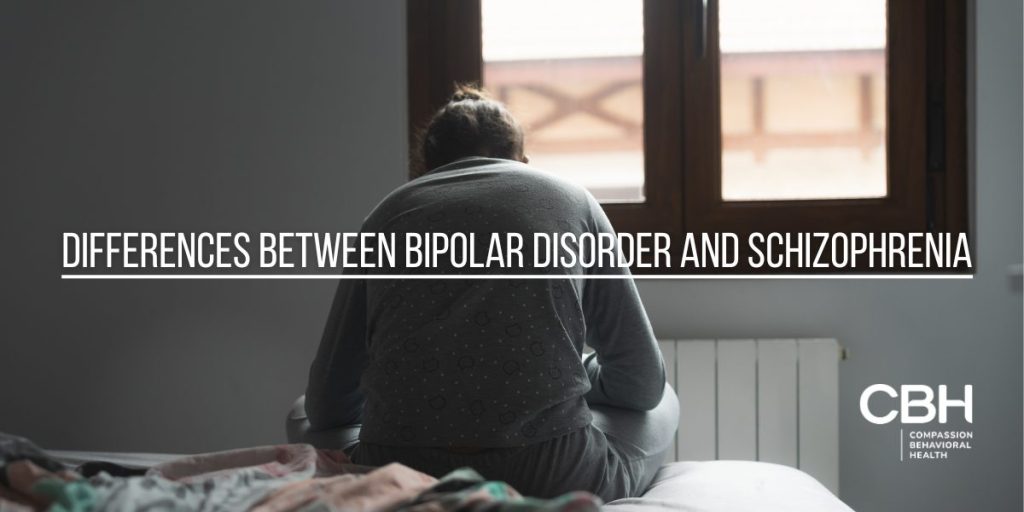Bipolar disorder and schizophrenia are two complex mental health conditions that can significantly impact an individual’s life. While both of these disorders may share some similarities, the differences between them are significant. Understanding the causes, symptoms, and treatment options for each condition is essential for proper diagnosis and recovery. In this article, we will compare and contrast bipolar disorder and schizophrenia in detail.
Understanding Bipolar Disorder
Defining Bipolar Disorder
Bipolar disorder, also known as manic depression, is a mental illness characterized by periods of unusual mood changes. These mood changes can range from manic episodes, where the person may feel extremely elated, energetic, and impulsive, to depressive episodes, where the person may feel sad, hopeless, and lose interest in activities they once enjoyed.
Types of Bipolar Disorder
There are several types of bipolar disorder, each with its own pattern of mood swings:
- Bipolar I Disorder: Characterized by at least one manic episode, which may be preceded or followed by hypomanic or major depressive episodes. Individuals with this type often experience severe disruptions in their daily lives, requiring comprehensive treatment plans.
- Bipolar II Disorder: Involves a pattern of depressive episodes and hypomanic episodes, but not the full-blown manic episodes that are typical of Bipolar I. This can sometimes lead to misdiagnosis, as the hypomanic episodes may not be as easily recognized.
- Cyclothymic Disorder: A milder form of bipolar disorder, featuring periods of hypomanic symptoms and periods of depressive symptoms lasting for at least two years. Though less severe, cyclothymic disorder can still significantly affect a person’s quality of life and relationships.
There are three types of bipolar disorder. There are some key differences between Bipolar I and II. Bipolar I is characterized by manic episodes lasting for at least 7 days, with depressive episodes lasting at least two weeks. Bipolar II is similar to bipolar I; however, the manic episodes are less severe and are classified as hypomanic, while depressive episodes last at least two weeks. Cyclothymic disorder involves hypomanic and depressive episodes but is less severe than the other two types of bipolar disorder.
Symptoms of Bipolar Disorder
The symptoms of bipolar disorder can vary widely, but they generally fall into two categories: manic/hypomanic and depressive symptoms. Recognizing these symptoms is vital for early intervention and effective management of the disorder.
- Manic Symptoms:
- Increased energy, activity, or restlessness
- Excessively happy or irritable mood
- Racing thoughts and rapid speech
- Decreased need for sleep
- Impulsive or risky behavior
- Depressive Symptoms:
- Feelings of sadness, emptiness, or hopelessness
- Loss of interest in activities once enjoyed
- Fatigue or loss of energy
- Difficulty concentrating or making decisions
- Thoughts of death or suicide
In addition to these symptoms, individuals with bipolar disorder may also experience changes in their appetite or weight, sleep disturbances, and feelings of worthlessness or guilt. These symptoms can lead to significant challenges in maintaining relationships, holding down a job, or pursuing personal goals. The unpredictability of mood swings can create a sense of instability, making it essential for individuals to develop coping strategies and seek professional help. Family members and friends often play a crucial role in supporting those with bipolar disorder, as understanding the complexities of the condition can lead to more effective communication and support networks.
Causes and Risk Factors
The precise cause of bipolar disorder is unclear; however, genetics, brain chemistry, and environmental factors are all thought to play a role. Bipolar disorder tends to run in families, suggesting a genetic component. Brain imaging studies have shown that people with bipolar disorder have differences in the structure and function of certain brain areas compared to those without the disorder.
Some potential environmental risk factors include significant life changes, such as the death of a loved one or a divorce, childhood trauma, drug abuse, and high-stress environments. Substance abuse, particularly cocaine, alcohol, and amphetamines, can trigger manic episodes in people with bipolar disorder.
It is important to note that bipolar disorder is a treatable illness. With proper treatment, including medication and therapy, people with bipolar disorder can lead fulfilling lives.
Understanding Schizophrenia
Schizophrenia is a complex and challenging mental health condition that affects millions of people around the world. Despite its prevalence, many people still struggle to understand what schizophrenia is, how it affects individuals, and what can be done to manage the symptoms of this condition.
Defining Schizophrenia
Schizophrenia is another severe and chronic mental health condition characterized by a range of symptoms such as hallucinations, delusions, disorganized thinking, and abnormal behavior. The condition is often misunderstood, and many people mistakenly believe that schizophrenia causes split personalities or violent behavior. However, this is not the case. Schizophrenia is a complex condition that can be challenging to manage, but with appropriate intervention and treatment, many individuals with schizophrenia can lead fulfilling lives.
Symptoms of Schizophrenia
Symptoms of schizophrenia can be divided into three main categories: positive, negative, and cognitive symptoms. Understanding these symptoms is crucial for early diagnosis and effective treatment, as they can significantly impact an individual’s ability to function in daily life.
- Positive Symptoms: These symptoms represent an excess or distortion of normal functions and include:
- Hallucinations (hearing voices, seeing things that are not there)
- Delusions (strongly held false beliefs)
- Disorganized thinking (difficulty organizing thoughts or connecting them logically)
- Negative Symptoms: These symptoms reflect a decrease in normal functions and include:
- Reduced emotional expression
- Apathy or lack of motivation
- Social withdrawal
- Cognitive Symptoms: These symptoms affect memory and cognitive processes, such as:
- Difficulty concentrating
- Memory problems
- Challenges with decision-making
In addition to these core symptoms, individuals with schizophrenia may also experience mood disturbances, anxiety, and difficulty in maintaining relationships. The social stigma surrounding mental illness can exacerbate feelings of isolation and despair, making it even more challenging for those affected to seek help. Treatment often involves a combination of antipsychotic medications and psychotherapy, which can help manage symptoms and improve quality of life. Support from family and friends, as well as community resources, plays a vital role in the recovery process, providing individuals with the encouragement and understanding they need to navigate their daily challenges.
Types of Schizophrenia
There are five types of schizophrenia, each with a distinct set of symptoms. These include paranoid schizophrenia, catatonic schizophrenia, disorganized schizophrenia, undifferentiated schizophrenia, and residual schizophrenia. The type of schizophrenia an individual has can impact diagnosis and treatment.
Paranoid schizophrenia is characterized by delusions and auditory hallucinations, while catatonic schizophrenia is characterized by unusual movements and behaviors. Disorganized schizophrenia is characterized by disorganized speech and behavior, while undifferentiated schizophrenia is a catch-all category for individuals who do not fit neatly into one of the other categories. Residual schizophrenia is characterized by a history of schizophrenia symptoms, but with fewer active symptoms present.
Causes and Risk Factors
The exact causes of schizophrenia remain unclear; however, genetic and environmental factors are thought to play a role. Some potential environmental risk factors include prenatal exposure to infections or malnutrition, childhood abuse or neglect, and stressful life events.
Research has also suggested that abnormalities in brain structure and function may contribute to the development of schizophrenia. Specifically, changes in the levels of certain neurotransmitters in the brain, such as dopamine and glutamate, may play a role in the development of schizophrenia.
While there is no known cure for schizophrenia, there are a variety of treatments available that can help manage symptoms and improve quality of life. These treatments may include antipsychotic medications, psychotherapy, and supportive services such as vocational rehabilitation and housing assistance.
Overall, schizophrenia is a complex and challenging condition that requires specialized care and attention. With appropriate treatment and support, however, many individuals with schizophrenia are able to lead fulfilling and meaningful lives.
Bipolar Disorder vs. Schizophrenia
Similarities in Symptoms
Both bipolar disorder and schizophrenia can cause significant emotional disruptions and often have symptoms that overlap. Hallucinations, delusions, and severe mood changes are common in both conditions. In some cases, severe manic or depressive episodes associated with bipolar disorder can lead to psychotic symptoms resembling schizophrenia.
Key Differences Between Bipolar Disorder and Schizophrenia
While both bipolar disorder and schizophrenia can significantly impact a person’s life, they differ in several key aspects:
Nature of the Disorders
Bipolar disorder is primarily a mood disorder, characterized by extreme mood swings. These swings can range from manic highs, where individuals may feel euphoric, energetic, and invincible, to depressive lows, where feelings of hopelessness and despair can dominate. In contrast, schizophrenia is a thought disorder, primarily affecting perception, cognition, and behavior. Individuals with schizophrenia may experience delusions, hallucinations, and disorganized thinking, which can severely impair their ability to function in daily life.
Symptoms
While both disorders can involve psychotic features, they manifest differently:
- In bipolar disorder, psychotic symptoms typically occur during manic or depressive episodes. For instance, during a manic episode, a person might believe they have extraordinary abilities or engage in risky behaviors without considering the consequences.
- In schizophrenia, psychotic symptoms are more pervasive and can occur even in the absence of mood episodes. This can lead to a persistent sense of paranoia or the belief that one is being controlled by external forces, which can be incredibly distressing.
Duration and Course
Bipolar disorder tends to have episodic patterns, with periods of mood stability in between episodes. These stable periods can vary in length, allowing individuals to lead productive lives, but they may also experience unpredictability in their mood cycles. Schizophrenia, on the other hand, is often a chronic condition that requires ongoing management. Individuals may face a continuous struggle with symptoms, which can fluctuate in intensity but rarely fully remit. This chronic nature necessitates a comprehensive treatment approach, often involving medication, therapy, and support systems to help manage the condition effectively.
Impact on Daily Life
The impact of these disorders on daily life can also differ significantly. Individuals with bipolar disorder may find that their relationships and work life are affected primarily during mood episodes, but they can often return to a baseline level of functioning during stable periods. In contrast, those with schizophrenia may find that their symptoms hinder their ability to maintain relationships or hold down a job consistently, as the cognitive and perceptual disturbances can create barriers to effective communication and social interaction. Additionally, the stigma surrounding both disorders can lead to social isolation, but the nature of the stigma may differ, with schizophrenia often facing more severe misconceptions and fears from the public.
The Role of Psychosis in Both Disorders
Psychosis, which is a break from reality, can occur in both bipolar disorder and schizophrenia. However, psychotic episodes in bipolar disorder tend to be shorter and less severe than those seen in schizophrenia, where they can last for weeks or months without proper treatment.
Diagnosis and Treatment
Diagnostic Criteria for Bipolar Disorder and Schizophrenia
Diagnosis for bipolar disorder and schizophrenia is based on clinical evaluation, medical history, and symptom analysis. Diagnostic criteria for bipolar disorder and schizophrenia vary, but there are specific hallmarks for each condition. Proper diagnosis is crucial for effective treatment and management of symptoms.
Treatment Options for Bipolar Disorder
Bipolar disorder treatment options include medication, therapy, and lifestyle changes. Medications such as mood stabilizers and antipsychotics can help manage manic and depressive episodes. Psychotherapy, including cognitive-behavioral therapy, can help individuals learn how to recognize and manage mood swings and other symptoms of bipolar disorder. Lifestyle changes, such as stress reduction, regular exercise, and healthy sleep habits, can also improve mood stability.
Treatment Options for Schizophrenia
Schizophrenia treatment options include medication, therapy, and support services. Antipsychotic medication is a cornerstone of schizophrenia treatment and can help manage symptoms such as hallucinations and delusions. Psychotherapy, including family therapy, may also help patients cope with symptoms and improve their quality of life. Support services such as vocational training, case management, and self-help groups can help individuals living with schizophrenia stay connected to their community and maintain their independence.
Evidence-based Mental Health Treatment at CBH in Florida
Bipolar disorder and schizophrenia are two severe and complex mental health conditions that can significantly impair an individual’s life. Despite some similarities in symptoms, the differences between these two disorders are significant. Proper diagnosis and treatment are essential for individuals affected by these conditions to manage their symptoms and maintain overall health and well-being. At Compassion Behavioral Health, our team provides mental health treatment to individuals throughout the United States from our beautiful South Florida center. To learn more, reach out to us directly at (844)503-0126



